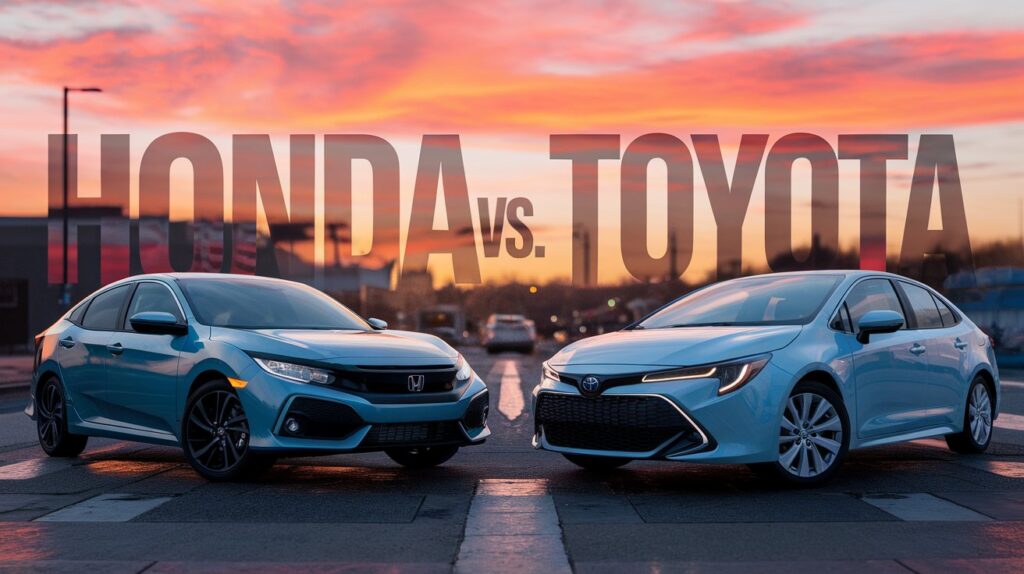When it comes to buying a car, two names always pop up: Honda and Toyota. As someone who’s spent years studying these brands, I’ve seen how they dominate roads worldwide. You probably notice them everywhere, too.
Here’s the thing: Both make great cars, but they shine in different ways. If you’re stuck choosing between them, I understand your confusion. With thousands of dollars on the line, you want to get this right.
That’s why I wrote this guide. I’ll break down everything that matters:
- Which brand saves you more money
- Who builds more reliable cars
- Where each brand excels (and falls short)
My comparison uses real data and hands-on experience, not just brochure talk. By the end of this article, you’ll know exactly which brand fits your needs better.
No marketing fluff – just honest insights to help you make the right choice for your next car.
Key Comparisons: Honda vs. Toyota
1. Performance Face-Off
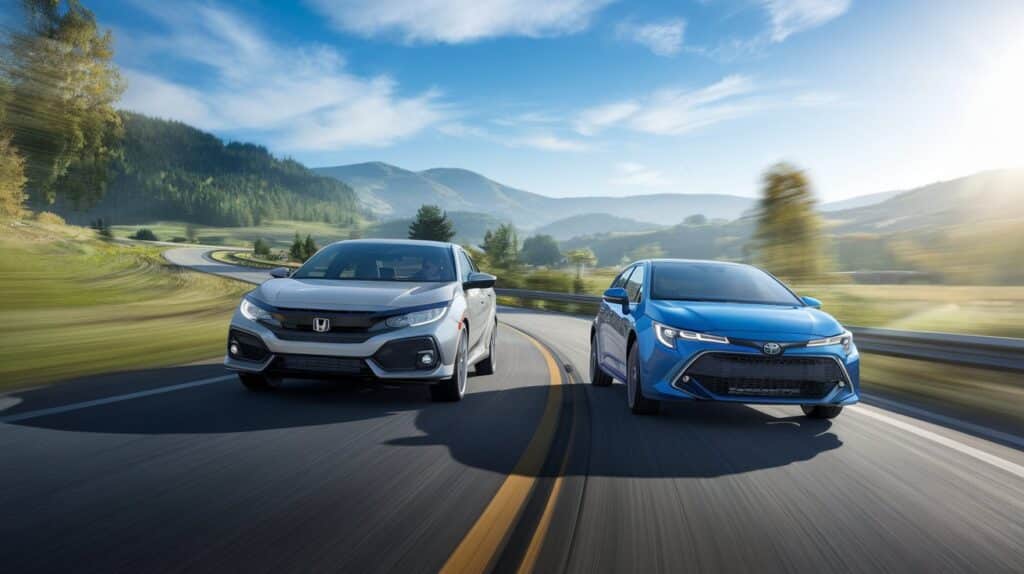
Let me break down how these popular cars stack up against each other.
Compact Sedans: Civic vs. Corolla
The Honda Civic gives you two engine choices:
- A basic 2.0L with 158 horsepower
- A turbocharged 1.5L pushing 180 horsepower
Toyota keeps it simpler. The Corolla comes with one engine – a 2.0L making 169 horsepower.
But here’s something interesting: While the Corolla has more base power, the Civic feels more fun to drive. Its sporty handling makes everyday driving more exciting.
SUV Battle: CR-V vs. RAV4
If you’re looking for space and comfort, here’s what you get:
- The CR-V comes with standard snow mode and hill descent
- Both seat 5 people comfortably
- CR-V offers more passenger room
The RAV4 fights back with better horsepower (203 vs 190), but the CR-V’s turbo engine feels livelier in real-world driving.
Sports Car Showdown: Civic Type R vs. GR Supra
Here’s where things get interesting:
- Civic Type R: 315 horsepower, manual transmission, seats 4
- GR Supra: 255 horsepower, automatic only, seats 2
Performance tip: If you love shifting gears yourself, the Civic Type R is your only choice between these two.
2. Reliability and Maintenance
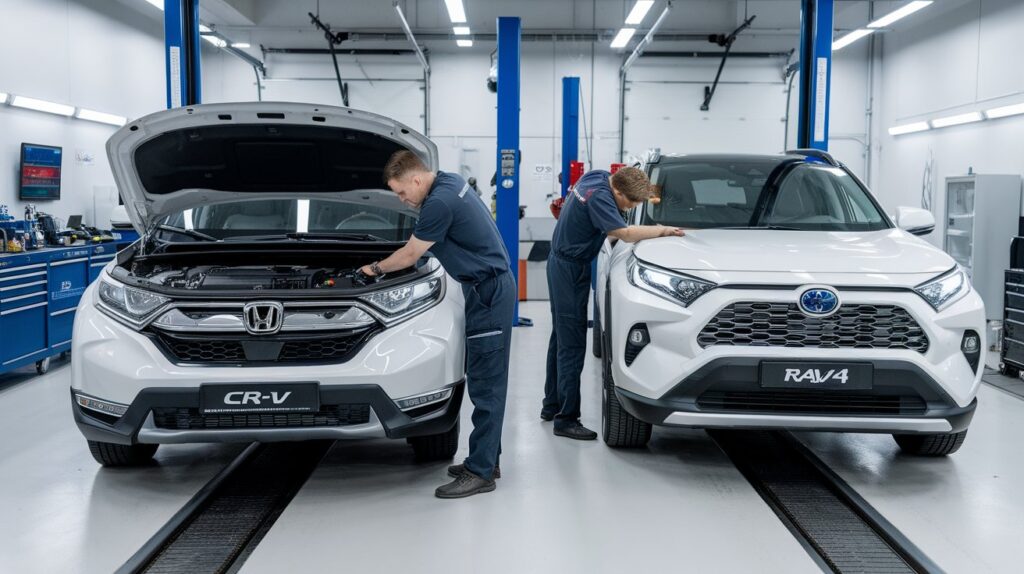
Both brands are known to last long, but let’s look at the numbers.
Expected Lifespan
- Honda vehicles typically last 200,000+ miles
- Toyota cars often exceed 200,000 miles too
10-Year Maintenance Costs
- Honda: Average $7,500
- Toyota: Average $6,000
Worth noting: RepairPal ranked Honda as the most reliable brand in 2022.
Recent Awards
- Honda: Top reliability rating from RepairPal (2022)
- Toyota: Second most reliable automaker after Mazda
Money-saving tip: Both brands keep repair costs low if you stick to regular maintenance schedules.
Remember: These numbers are averages. How you drive and maintain your car matters more than brand reputation alone.
3. Affordability
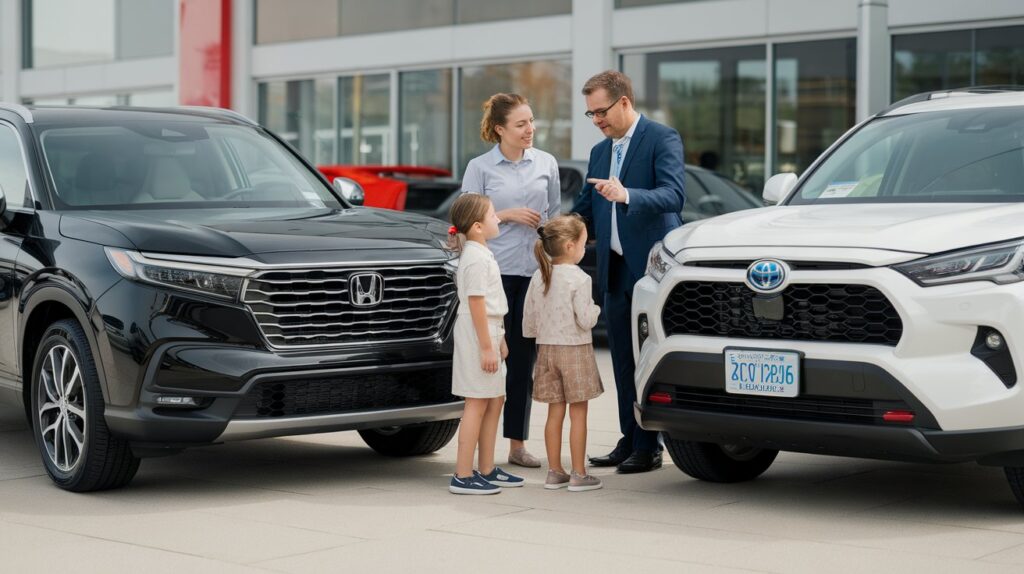
Let me show you how these brands compare in price.
Popular Models Head-to-Head
- Compact Cars
- Honda Civic: Starts at $21,900
- Toyota Corolla: Starts at $20,075
- Difference: Save $1,825 with Toyota
- Family SUVs
- Honda CR-V: Starts at $28,410
- Toyota RAV4: Starts at $27,575
- Difference: Save $835 with Toyota
Money-saving tip: Toyota often wins the price game, but don’t forget to check what features come standard.
4. Fuel Savings Breakdown
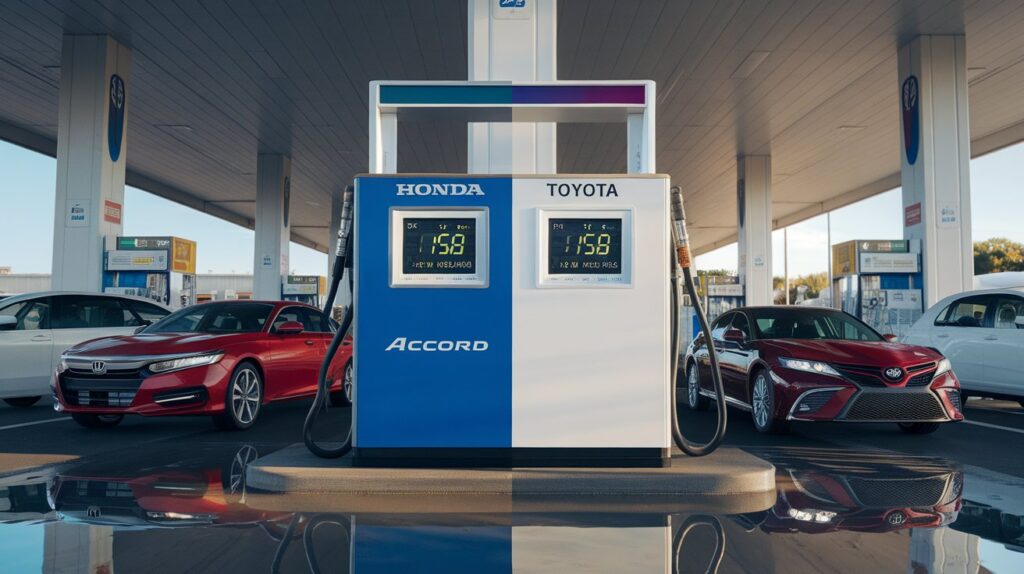
Here’s what you can expect to spend at the pump.
Sedan Comparison
Honda Accord vs. Toyota Camry:
- Accord: 30 city/38 highway MPG
- Camry: 28 city/39 highway MPG
- Real talk: Both are great on gas, but Accord wins in city driving
SUV Face-Off
CR-V vs. RAV4:
- CR-V: 28 city/34 highway MPG
- RAV4: 27 city/34 highway MPG
- Bottom line: Nearly identical fuel costs
Truck Battle
Ridgeline vs. Tacoma:
- Ridgeline: 18 city/24 highway MPG (AWD standard)
- Tacoma: 19 city/22 highway MPG (4WD)
- Important note: Ridgeline comes with AWD standard, while Tacoma charges extra for 4WD
Pro tip: Don’t just look at MPG numbers. Think about your driving style and where you’ll use the vehicle most.
Annual Fuel Costs (based on 15,000 miles/year):
- Honda sedans: About $1,650
- Toyota sedans: About $1,700
- Difference: Small enough that other factors should guide your choice
5. Safety Features
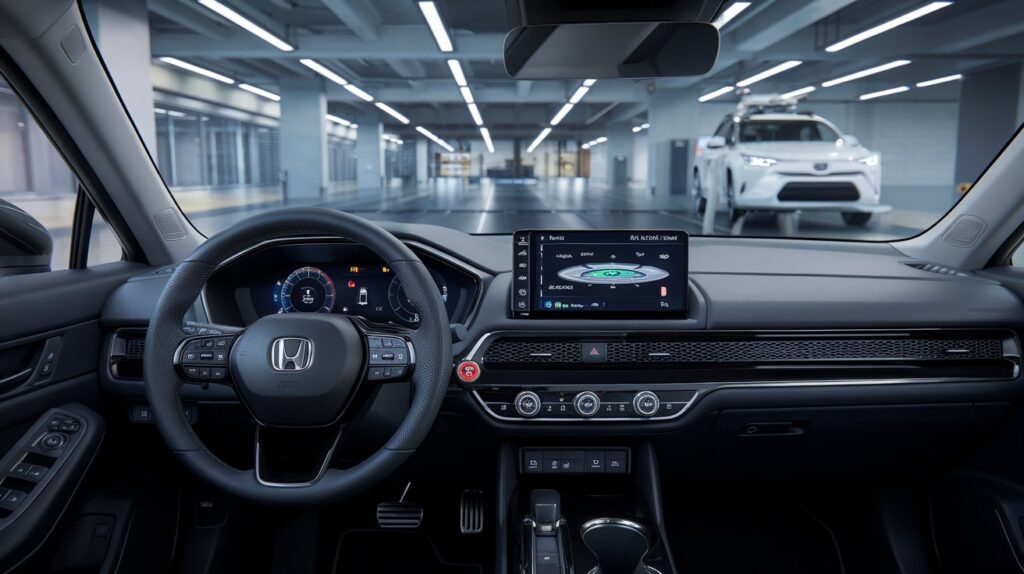
Both brands take safety seriously, and I’ve seen how this shows up in their cars. Let me share what matters most.
Standard Safety in Every Car
Honda packs these features in all models:
- Automatic emergency braking
- Lane-keeping assist
- Adaptive cruise control
- Blind spot warnings
Toyota includes similar protections:
- Forward collision prevention
- Lane departure alerts
- Road sign detection
- Dynamic radar cruise control
Here’s something interesting: You don’t have to buy the expensive models to get these safety features. They come standard in even the basic versions.
Crash Test Performance
Both brands earn top marks in safety tests. The latest models from Honda and Toyota score 5 stars from NHTSA. Most also earn the IIHS Top Safety Pick+ award.
6. Model Variety
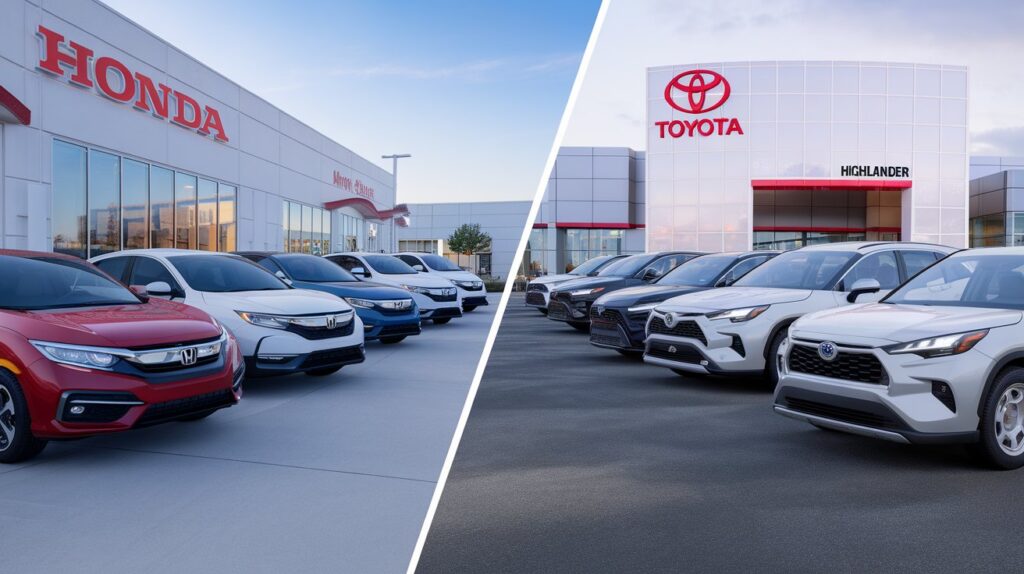
Honda’s Lineup keeps things simple with 15 models. You’ll find:
- Popular cars like the Civic and Accord
- SUVs from compact to full-size
- One pickup truck option
- A mix of hybrid choices
Toyota’s Range offers more choices with 25 models, including:
- More SUV options
- Several truck sizes
- More hybrid and electric vehicles
- Multiple luxury options
Quick tip: More choices aren’t always better. Think about what you really need in a car.
Look at your daily life first. Do you need basic transportation, family space, or something specialized? That matters more than the number of models available.
Remember: The best car isn’t the one with the most features – it’s the one that fits your life perfectly.
Unique Strengths and Weaknesses
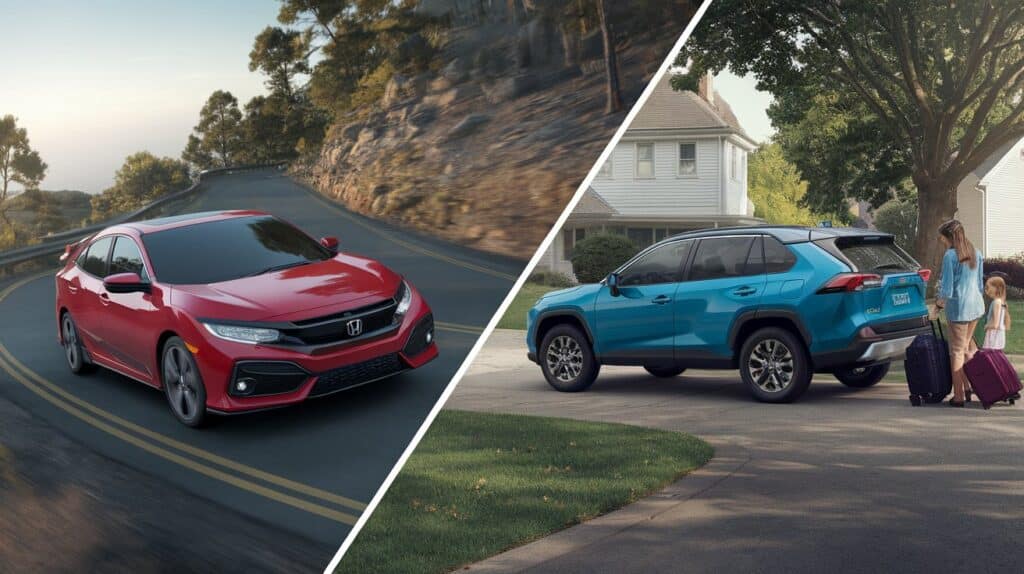
Why Honda Stands Out
I’ve seen many Honda owners smile about their cars’ sporty feel. Even the basic Civic feels eager to move, while the CR-V responds like a smaller car. That’s rare for an SUV.
Power When You Want It: Honda’s engines are special. They make every drive more fun. The turbocharged engines pack more punch than you’d expect, especially in city driving.
Plus, they’re smart with gas. You’ll notice this most when merging onto highways or passing other cars.
But here’s where Honda stumbles: Their entertainment systems feel outdated. The screens can be tricky to use, and connecting your phone isn’t always smooth. Some drivers also mention that road noise sneaks in more than they’d like.
Toyota’s Strong Points
Toyota plays a different game. They focus on making cars that last forever and cost less up front.
Built to Last: When you buy a Toyota, you’re getting a car that could easily pass 200,000 miles. That’s not just talk – check any used car lot. You’ll find old Toyotas still running strong.
The money factor: Toyotas typically cost less when new, and they hold their value better. When you decide to sell, you’ll often get more money back compared to other brands.
Where Toyota Could Do Better: Not everything’s perfect. Many Toyota models have smaller trunks than you’d expect. The engines, while reliable, don’t feel as exciting as Honda’s.
Some people say driving a Toyota feels more like doing a job than having fun.
Making Your Final Choice: Honda or Toyota?
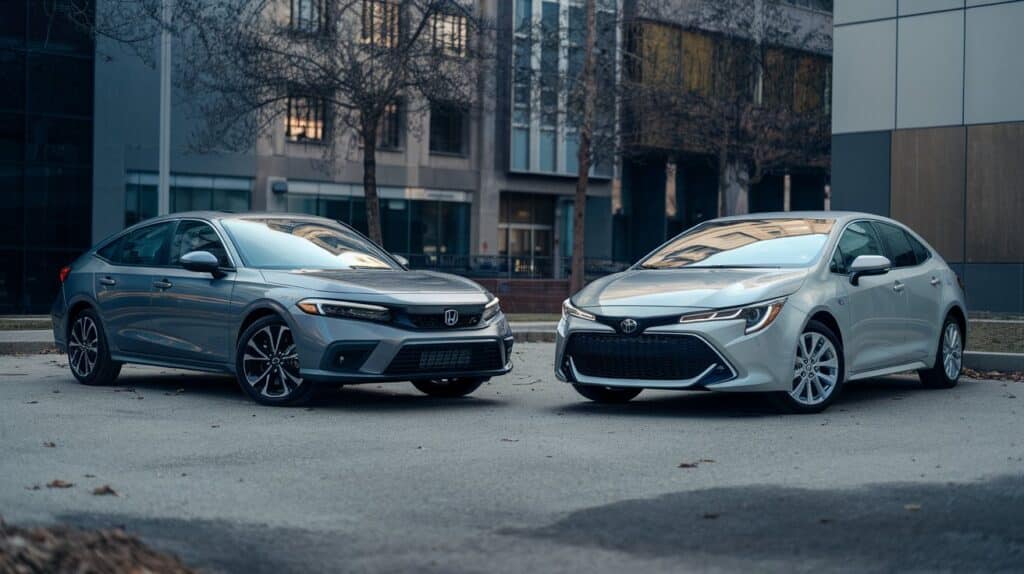
It’s All About Your Priorities
Let me help you find your perfect match without getting lost in the details.
Choose Honda If You Love Driving
Think Honda if you want a car that makes daily drives more fun. The steering feels sharper, the engines are peppy, and even their family cars have a sporty edge. You’ll especially love Honda if:
- You enjoy taking the long way home
- You want both comfort and performance
- You don’t mind paying a bit more for better handling
Real talk: Honda shines when you value the journey as much as getting there.
Pick Toyota If You Want Peace of Mind
Toyota makes sense if you want a car that just works, year after year. They’re built to last and often cost less to own. Toyota is your best bet when:
- You want the most value for your money
- You plan to keep your car for many years
- You prefer reliability over excitement
Money matters: Toyota usually wins on initial price and long-term savings.
Wrapping It Up
Both Honda and Toyota earn their stellar reputations, but in different ways.
Here’s what I’ve learned after comparing these giants: Honda builds cars for people who love driving, while Toyota focuses on lasting value. Neither choice is wrong – it’s about what matters most to you.
Think about your daily life. Do you smile at the thought of a winding road? Honda might be your match. Looking for a car that’ll run forever without breaking the bank? Toyota could be your answer.
My best advice: Don’t just take my word for it. Visit local dealerships and sit in these cars. Touch the controls. Take them for a drive. Pay attention to how each one makes you feel.
Remember: The best car isn’t about winning comparisons – it’s about fitting perfectly into your life.
Need more details? Check out official Honda and Toyota websites for specs, or visit dealerships to get behind the wheel.

